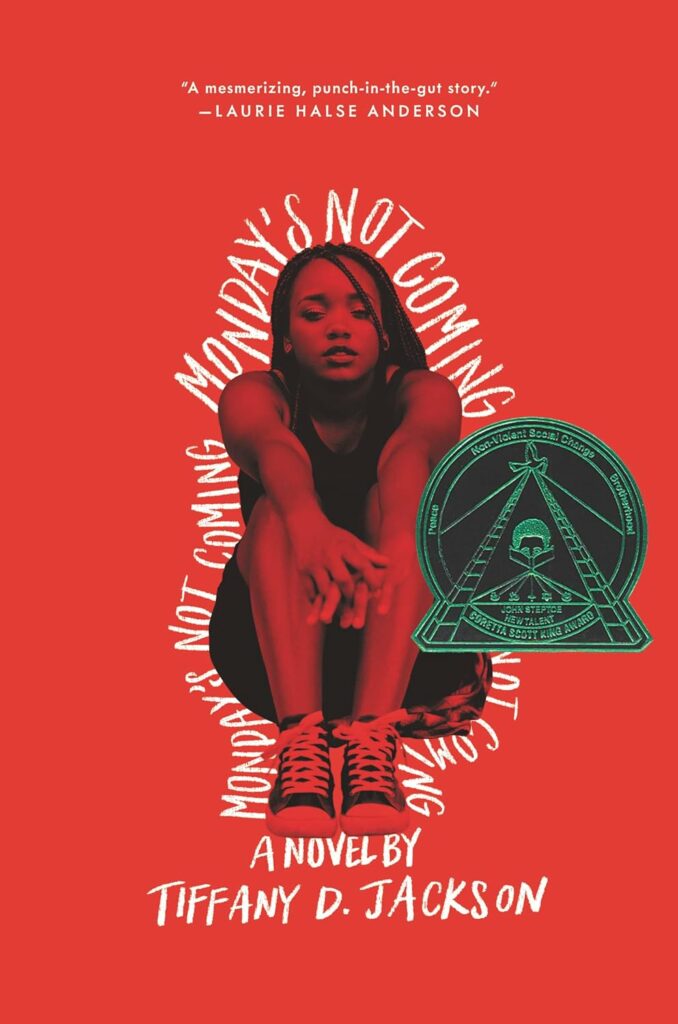In today’s post, our focus shifts to Tiffany D. Jackson’s powerful novel “Monday’s Not Coming.”. We’ll cover several key aspects to provide a comprehensive understanding of this compelling story. First, we’ll begin with an extended summary, giving you an overview of the plot and its major themes, setting the stage for a deeper analysis. Next, we’ll introduce the characters who bring this narrative to life, each with their unique complexities and contributions to the story’s development.
We’ll also highlight some poignant quotes from the book, which encapsulate its essence and thematic depth. Finally, we’ll round off our exploration with a set of thought-provoking book club questions. These questions are designed to spark rich discussions, offering various angles to examine the novel’s multifaceted narrative and themes.
Monday’s Not Coming Summary
“Monday’s Not Coming” by Tiffany D. Jackson is a profoundly moving novel that delves deep into the themes of friendship, neglect, and the often-overlooked struggles of young people in society. The story revolves around Claudia, a teenager whose world turns upside down when her best friend, Monday Charles, mysteriously disappears. Claudia and Monday were more than just friends; they were like sisters, sharing an unbreakable bond. This makes Monday’s absence not only alarming for Claudia but also deeply personal.
The novel begins with a sense of urgency and confusion as Claudia realizes that Monday is missing. It’s not just a day or two; Monday has vanished without a trace as days stretch into weeks. What’s deeply troubling is the lack of concern from others. Claudia’s growing desperation is palpable as she grapples with Monday’s disappearance, facing a wall of indifference from adults and peers alike. It’s a stark portrayal of how easily a young girl, especially one from a marginalized community, can slip through the cracks of society.
As Claudia digs deeper, the narrative takes us through a labyrinth of clues and revelations. The complexity of Monday’s family life, the cryptic behavior of her mother and sister, and the dismissive attitude of authorities paint a grim picture of neglect and oversight. Jackson masterfully weaves a tale that is as much a social commentary as it is a mystery. The reader is drawn into Claudia’s world, feeling her frustration, fear, and determination.
The book is a poignant reminder of the challenges faced by those who are disenfranchised and forgotten. It’s a call to action, urging readers to pay attention, to advocate, and to remember those who are overlooked. Jackson’s characters, particularly Claudia, are crafted with depth and authenticity, making their experiences resonate long after the last page is turned.
Photo: Amazon
In an educational context, this novel is a powerful tool. It opens up discussions about social justice, the importance of community support, and the role of educators and adults in noticing and addressing the struggles of young people. It’s a story that teaches empathy and awareness, making it a valuable addition to any curriculum focused on social issues or adolescent psychology.
For educators and parents alike, “Monday’s Not Coming” is a mirror reflecting the often harsh realities faced by many young people. It’s a compelling narrative that not only captivates but also educates, making it a must-read in our ongoing quest to understand and support the youth in our communities.
Monday’s Not Coming Characters
Here’s a look at some of the key characters making up Monday’s Not Coming:
- Claudia: The protagonist, Claudia, is a deeply empathetic and observant teenager. Her determination to find Monday drives the narrative. Claudia’s character is marked by her loyalty and the sense of loss she feels in Monday’s absence. She is the lens through which we experience the story, and her journey is both heart-wrenching and insightful.
- Monday Charles: Monday is the missing friend around whom the story revolves. Though physically absent for most of the novel, her presence is strongly felt through Claudia’s memories and the impact she had on those around her. Monday is portrayed as a vibrant, essential part of Claudia’s life, making her disappearance all the more alarming and confusing.
- Ms. Valente and Mr. Douglas: These are Claudia’s teachers. Their roles are crucial in highlighting the different reactions of adults to Monday’s disappearance. They represent the varying degrees of attention and concern that adults have towards the issues faced by young people, particularly those from marginalized communities.
- Monday’s Mother and Sister (April): The behavior and reactions of Monday’s family members add layers of mystery and complexity to the story. They are enigmatic figures, whose actions (or lack thereof) regarding Monday’s disappearance raise many questions. Their characters underscore themes of family secrecy and neglect.
- Michael, Claudia’s Brother: Michael is a supportive figure in Claudia’s life. His interactions with Claudia provide a glimpse into her home life and family dynamics, offering a contrast to Monday’s family situation.
- Dee, Claudia’s Dance Teacher: Dee is another significant adult in Claudia’s life. Her role is indicative of the positive influence that mentors and non-family adults can have in the lives of adolescents.
Monday’s Not Coming Quotes
Here are some interesting quotes that capture the thematic essence of the Monday’s Not Coming:
- “Well, sometimes the people we love the most can hurt us the most.” ― Tiffany D. Jackson, Monday’s Not Coming
- “I know what you’re thinking. How can a whole person, a kid, disappear and no one say a word? Like if the sun just up and left one day, you’d think someone would sound an alarm, right? But Ma used to say, not everyone circles the same sun. I never knew what she meant by that until Monday went missing.” ― Tiffany D. Jackson, Monday’s Not Coming
- “Like the color pink, someone always sees the story different. Some see rose and magenta, and other see coral and salmon. When at the end of the day, it’s just regular old pink.” ― Tiffany D. Jackson, Monday’s Not Coming
- “This is the story of how my best friend disappeared. How nobody noticed she was gone except me. And how nobody cared until they found her . . . one year later.” ― Tiffany D. Jackson, Monday’s Not Coming
- “There is a calm in the chaos that most folks don’t see.” ― Tiffany D. Jackson, Monday’s Not Coming
- “But when help isn’t invited, it ain’t nothing but an unwanted houseguest.” ― Tiffany D. Jackson, Monday’s Not Coming
- “You only get one shot at your kids, so you need to hit the bull’s-eye.” ― Tiffany D. Jackson, Monday’s Not Coming
- “Kids tend to forget their roots. But roots are always the first to carry you back home.” ― Tiffany D. Jackson, Monday’s Not Coming
- “Rumors are born with legs that can run a mile in less than a minute. Rumors eat up dreams without condiments. Rumors do not have expiration dates. Rumors can be deadly. Rumors can get you killed.” ― Tiffany D. Jackson, Monday’s Not Coming
- “In this life, you don’t always get what you want, but you must dance through it,” ― Tiffany D. Jackson, Monday’s Not Coming
- “Mondays are the best days! Like, aren’t you excited about the start of a new week? It’s like a new chapter in a book.” ― Tiffany D. Jackson, Monday’s Not Coming
Related: Good Girl Bad Blood Summary, Characters, and Book Club Questions
Monday’s Not Coming Book Club Questions
Certainly! Creating book club questions for “Monday’s Not Coming” by Tiffany D. Jackson can spark insightful discussions. Here are some thought-provoking questions that delve into various aspects of the book:
- Character Analysis: How does Claudia’s character develop throughout the novel? In what ways do her experiences shape her perception of the world and her relationships with others?
- Themes of Awareness and Neglect: The novel deals heavily with themes of neglect and the lack of awareness in communities and institutions. How does this theme play out in the story? Can you cite specific instances where neglect or oversight had a significant impact?
- Impact of Setting: How does the setting of the story – both the physical location and the societal context – influence the events of the novel? Do you think Monday’s disappearance would have been handled differently in another setting?
- Family Dynamics: Explore the family dynamics in Monday’s and Claudia’s lives. How do these dynamics contribute to the unfolding of the story? What do you think Jackson is trying to convey about family through these characters?
- Symbolism and Motifs: Were there any symbols or recurring motifs in the novel that stood out to you? How do they contribute to the overall theme and message of the book?
- The Role of Friendship: Discuss the role of friendship in the novel. How does the relationship between Monday and Claudia drive the plot? What does their friendship reveal about each character?
- Social Commentary: “Monday’s Not Coming” can be seen as a social commentary. What social issues does Jackson bring to light? How does the book encourage readers to think about or act on these issues?
- Plot Structure and Narrative Style: The narrative structure of the book is non-linear. How did this affect your reading experience? Do you think this style was effective in telling Claudia and Monday’s story?
- Personal Reflection: Did any part of the story resonate with you personally? Were there moments or characters that you found particularly relatable or thought-provoking?
- Author’s Purpose: What do you think Tiffany D. Jackson’s purpose was in writing this book? Did she achieve her purpose, in your opinion?
Final thoughts
In wrapping up our journey through Tiffany D. Jackson’s “Monday’s Not Coming,” we’ve traversed the landscape of a heart-rending narrative that challenges and engages readers on multiple levels. From the detailed summary, we gained insights into the plot’s intricacies and its emotional impact.
The characters we met are not just figures in a story, but representations of deeper societal issues, each adding a layer of complexity to our understanding. The quotes we highlighted served as poignant reminders of the novel’s thematic richness and Jackson’s powerful storytelling. Lastly, the book club questions we discussed are not just conversation starters but gateways to deeper understanding and empathy.











